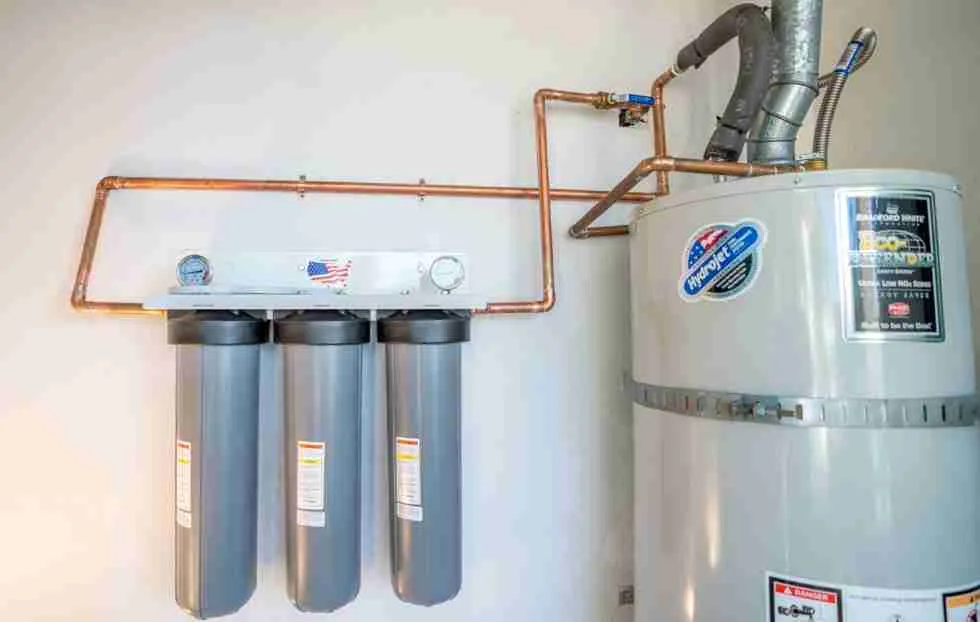
——————— Learn how a water filtration system can help ———————
Did you know the quality of your water can differ depending on your city or location of your home? City water usually comes from rivers, lakes, reservoirs, or underground aquifers and is treated at a centralized treatment plant by the local municipality. What’s in the water can differ due to minerals in the local soil and contaminations in the area. Fortunately, there are several water filtration options available to prevent harmful chemicals from entering your home’s water supply.
What is a whole house water filtration system and how does it work?
A whole house water filtration system can help by identifying and treating exactly what the problem is in your water. It works by purifying all the water that enters the home, versus filtering the water at a single point of use (kitchen faucet or refrigerator). The filtration system is typically installed near the main water line or the water meter, and works by going through the following process:
- Pre-Filtration: In the pre-filtration stage, the water from the main supply enters the filtration system and larger particles such as sediment, sand, rust, and debris are removed. This stage helps to prevent clogs in the system.
- Primary Filtration: After the pre-filtration stage, the water goes through one of the primary filtration stages, which depends on your home’s system type. This could include activated carbon filters, water softeners, or other specialized filters. The filter type is specifically for certain contaminants such as chlorine, chloramines, volatile organic compounds (VOCs), heavy metals, hardness minerals (like calcium and magnesium), or other impurities.
- Distribution: After the water has been filtered, it is distributed throughout the entire house. All the water outlets in the house will receive filtered water from the whole house filtration system.
Point of Use (POU) Filters:
For those looking at more targeted solutions, Point of Use (POU) filters are designed to purify water at the exact spot where it’s consumed, such as at a sink faucet  or in a refrigerator. These water filters excel at removing local contaminants, ensuring water is safe at the moment of use. They are affordable, easy to install, and efficient at improving water taste and quality. However, regular maintenance is required, and multiple units may be needed to cover all water usage points.
or in a refrigerator. These water filters excel at removing local contaminants, ensuring water is safe at the moment of use. They are affordable, easy to install, and efficient at improving water taste and quality. However, regular maintenance is required, and multiple units may be needed to cover all water usage points.
What are the different types of water filtration systems?
There are several different options for whole house water filtration systems, and the one you choose for your Cincinnati home will depend on the minerals and chemicals found in your water supply. Here are the most common types:
- Mechanical Filters: Filters out large particles like sand and clay using a cartridge or mesh, without removing chemical contaminants.
- Activated Carbon Filtration: Absorbs chemical contaminants such as chlorine and VOCs, trapping them on the carbon surface for cleaner water.
- Water Softeners: Uses ion exchange to remove hard minerals like calcium and magnesium, preventing scale buildup and appliance damage.
- UV Sterilization: Kills bacteria, viruses, and microorganisms using UV light, ensuring water is safe from biological threats.
- Reverse Osmosis (RO): Offers high purification levels by filtering water through a semi-permeable membrane, removing a wide range of contaminants.
It’s common to combine multiple types that work together in stages to remove a wide range of contaminants. Proper and consistent maintenance is crucial to ensure your water filtration system performs properly.
How can I benefit from installing a water filtration system in my home?
By installing a water filtration system in your home, you are ensuring that the Cincinnati water you consume is clean, safe, and of a high-quality. This applies to drinking water and the water used for bathing, cooking, and other purposes, providing peace of mind by removing potentially harmful contaminants and impurities from your water supply prior to use. Benefits to your health and your home include:
- Healthier and better tasting drinking water
- Better indoor air quality to reduce problems with allergies and asthma
- Longevity of appliances and plumbing fixtures
- Avoid water contamination from local water supply
What is the future of water filtration technology?
Water filtration technology is continually evolving, with advancements aimed at removing a wider range of contaminants, offering scalable systems to adapt to water quality, integrating smart monitoring for real-time control, focusing on energy-efficient designs, and providing quality analytics and reporting for homeowners.
If you are considering the purchase of a new water filtration system in Cincinnati, Blue Chip Plumbing can help. Our service technicians will come to your home to test your water and provide a recommendation on the system that is best suited for you. Contact us here or give us a call today at (513) 999-6820 to speak to one of our plumbing specialists.

